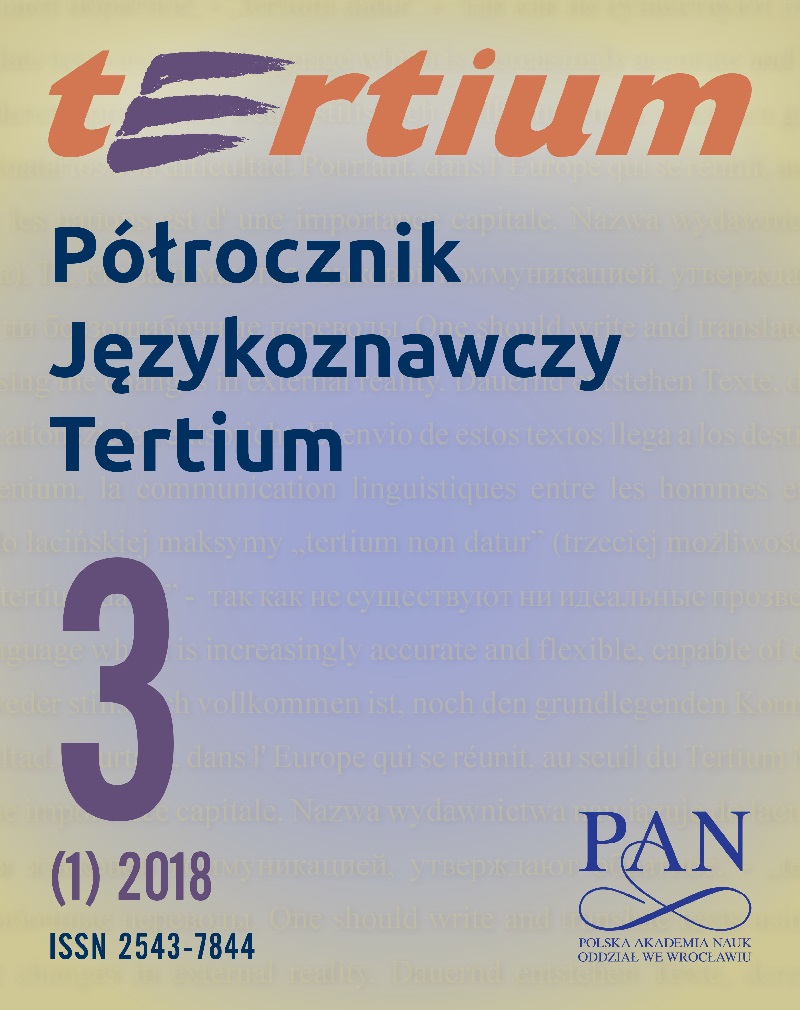Abstrakt
The overall aim of the current paper is to establish best practices for developing, engaging and working critically in virtual cultural communication. The need to build practical language communication skills is not a new idea or a new part of methodology. With the development of technology, the range of communicative opportunities has grown and allowed virtual cultural dialogues to take place. The focus of these situations is not only language development and practice, but also critical cultural awareness and intercultural skill development.
The paper presents contrasting approaches in the methodological construction of one such programme between young students in Entel Foreign Language School, China, and Krosno State College, Poland. Over the course of the link from Spring to Summer 2017, different approaches were taken by the instructors and students in both countries resulting in varying levels of engagement and critical understanding.
The Chinese approach stresses communication as an outcome and delivers more time to oral activities in the classroom which contrasts with the Polish approach of a stricter language based teaching strategy. As a result, the paper will discuss the relative merits of the two methodological frameworks in the communication project. This will be achieved by evaluating the overall success of the communication based on interviews with the student participants and observations of interaction during the link meetings. Finally, the paper will illustrate a methodology for working with such links and developing cross-cultural communication.
Bibliografia
Beaudin, Bart P. (1999) “Keeping Online Asynchronous Discussions on Topic.” Journal of Asynchronous Learning Networks 3(2); 41–53.
Brighton, Christopher (forthcoming) “Critical Thinking in Online Intercultural Learning.” Proceedings of the International Conference Across: [27-29 April 2017, Tartu].
Byram, Michael (1997). Teaching and Assessing Intercultural Communicative Competence. Clevedon: Multilingual Matters.
Chia, Rosina, Elmer Poe, Biwu Yang (2011) “History of Global Partners in Education.” Global Partners in Education Journal. Volume 1 (1); 3–7.
Damen, Louise (1987) Culture learning: The fifth dimension in the language classroom. Reading, Mass: Addison-Wesley Pub. Co.
Council of Europe. (2018). Common European Framework of Reference for Languages: Learning, teaching, assessment. Strasbourg: Cambridge University Press. [Retrieved July 20, 2018, from Council of Europe] https://www.coe.int/en/web/common-european-framework-reference-languages/level-descriptions
Graddol, David, Kingsley Bolton (2012) “English in China Today.” English Today. Volume 28 (3); 3–9. doi: 10.1017/S0266078412000223
Hale, Aileen, Jennifer Snow-Gerono, Fernanda Morales (2008) “Transformative Education for Culturally Diverse Learners Through Narrative and Ethnography.” Curriculum, Instruction, and Foundational Studies Faculty Publications and Presentations. 1–16. doi: 10.1016/j.tate.2007.11.013
“Information from the Ministry” (2018, 04 10) Retrieved from Ministry for Higher Education: http://www.nauka.gov.pl/aktualnosci-ministerstwo/
Jickling, Bob, Arjen E. J. Wals (2008) “Globalization and environmental education: looking beyond sustainable development” Curriculum Studies. Volume 40 (1); 1–21. doi: 10.1080/00220270701684667
Kasztalska, Aleksandra (2014) “English in Contemporary Poland”. World Englishes. Volume 33 (2); 242–262.
Kearsley, Greg (2002) “Is online learning for everybody?” Education Technology. Volume 41 (1); 41–44
Kitchenham, Andrew (2008) “The Evolution of John Mezirow's Transformative Learning Theory.” Transformative Education. Volume 6 (2); 104–125. doi: 10.1177/1541344608322678
Kramsch, Claire (1993) Context and Culture in Language Teaching. Oxford: OUP.
Lin, Xu (2007) “Cultural Dimensions and Conversational Strategies - Conversational strategies adopted in different cultures and the way to bridge the gap.” US-China Foreign Language. Volume 5 (4); 71–76.
McKay, Sandra L. (2008) Teaching English as an International Language: Rethinking Goals and Approaches. Oxford: OUP.
Ng, Connie Siew Ling, W.S. Cheung, K.F. Hew. (2011). “Interaction in asynchronous discussion forums: peer facilitation techniques.” Journal of Computer Assisted Learning. Volume 28 (3); 280–294. doi: 10.1111/j.1365-2729.2011.00454.x
Paloff, Rena. M., Keith Pratt (2011) The excellent online instructor: Strategies for professional development. San Francisco, CA: Jossey Bass
Potisková, Ingrid (2012) “The Virtual Communication in the Education System.” Studia commercialia Bratislavensia. Volume 5 (17); 117-123. doi:10.2478/v10151-012-0002-y
Public Opinion Research Center (2010) “Polish Values: What is important, What is permitted, What must not be done.” CBOS. Retrieved from: https://www.cbos.pl/PL/publikacje/public_opinion/2010/07_2010.pdf.
Quappe, Stephanie, Giovanna Cantatore. (2007) “What is Cultural Awareness, anyway? How do I build it?” Retrieved from: http://www.culturosity.com/articles/whatisculturalawareness.htm
Smith, Regina O. (2002) “Working with Difference in Online Collaborative Groups”. Adult Education Quarterly. Volume 55 (3); 182-199. doi:10.1177/0741713605274627
Zhu Erping, Patricia Payette, Deborah DeZure. (2003). “An Introduction to teaching Online”. CLRT Occassional Papers. Number 18. Retrieved from: http://www.crlt.umich.edu/sites/default/files/resource_files/CRLT_no18.pdf

Utwór dostępny jest na licencji Creative Commons Uznanie autorstwa – Użycie niekomercyjne – Bez utworów zależnych 4.0 Międzynarodowe.
Prawa autorskie (c) 2018 Półrocznik Językoznawczy Tertium

